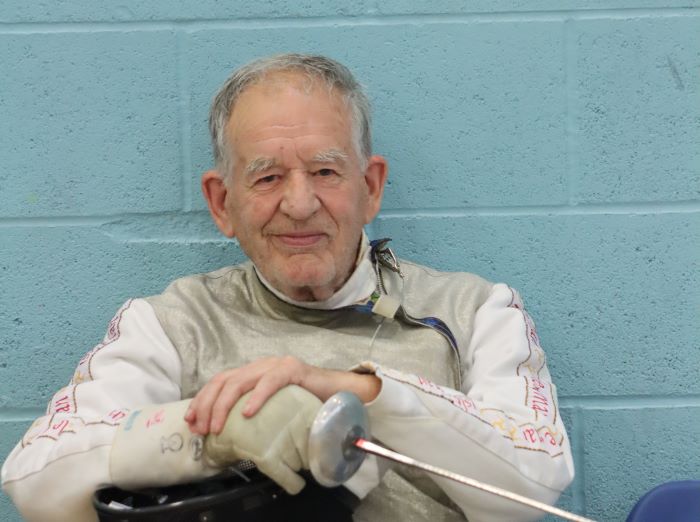Henry de Silva, founder of the Veteran Fencing movement is 90 today!
On behalf of all the members of British Veterans Fencing, Carl and the Committee send Henry our very best wishes on this special occasion!
To mark this milestone, Malcolm Fare, BVF Press Officer, has put together this article celebrating Henry’s many achievements in the world of fencing.
HENRY DE SILVA – STILL GOING STRONG AT 90
Henry de Silva celebrates his 90th birthday today the 16th November. He started fencing when he joined the Royal Navy at the age of 15 and the following year hitchhiked to Paris to fence at the Cité Université. After leaving the Navy in 1952, he started the Guildford Technical College Fencing Club, going on to become match secretary for Surrey and helping to produce the county magazine To The Point. Soon he was organising fencing trips abroad, starting with a group in a London taxi to a number of clubs in Germany.
After qualifying as a sports coach, he moved to Birmingham where he established the Portland Fencing Club, which at one point had 99 members. Among his pupils was Sue Green, whom he took on her first trip abroad to Krefeld in Germany where she reached the final; she went on to win all the major British women’s foil tournaments, including the senior championship in 1969, and twice fenced for Britain at the Olympics.
Henry moved on to Leicester, coaching and fencing competitively whenever he wasn’t lecturing on PE. On his 40th birthday he won the Tyneside Open epee. He started several clubs in the area, becoming chairman of Leicester County Fencing Union and an executive on the East Midlands Sports Council. He organised the first age group championship for girls, ran school leagues and for several years organised one of the Leon Paul Junior Series. He has also run fencing clinics in Europe, North America and Asia.
But his greatest service to the sport was as the founder of veterans fencing in Britain and Europe. In 1980 he organised the first veterans’ epee competition, which attracted just six epeeists. It was not held again until 1987, when he transformed it into a five-weapon national championships (women’s sabre was added in 1999) and 2 years later he formed the National Veterans Association (now British Veterans Fencing). Henry travelled all over the country encouraging fencers over the age of 45 to stay on in the sport. In 1991 he formed the European Veterans’ Association and organised its first championships, persuading a handful of fencers from England and Germany to stay in converted Nissen huts in the grounds of Beaumanor Hall, near Loughborough, Leicestershire.
From these small beginnings, the movement has grown to become one of the most successful ventures in fencing, with a national membership of around 600, biennial European championships now approaching 1800 entries across all weapons and age groups from 40-49 to 75+ and 4-yearly Commonwealth championships. The success of these events resulted in the FIE organising annual world veterans’ championships for fencers from more than 20 countries. There is also a veterans’ Winton Cup, a Celtic challenge and many other competitions for veterans. Henry is Life President of British Veterans Fencing, Vice-President of the Commonwealth Veterans Association and a former Chairman of the European Veterans Association.
In 1991 he wrote a three-weapon manual, Fencing: The Skills of the Game, a second edition of which was published in 1997, and was still taking copies to sell at competitions more than 20 years later. Ceaseless in his quest to spread the gospel of veterans fencing around the world, Henry has organised groups to visit Denmark, Finland, Germany, Lithuania, Luxemburg, Poland, Russia, Spain and further afield, including Tunisia, South Africa, Mexico, New Zealand and Japan.
For the past 30 years, Henry has lived on the Isle of Man, where he continues to coach and, until five years ago, fence competitively at veteran events. He also played competitive table tennis and was a regular race walker. At the age of 75 he completed a 10-mile walk in 2 hr 03 min 19 sec, which unofficially made him the fastest man in the country at that distance in his age group.
Ten years later, he entered the European veterans’ championships in France without bothering to have his equipment passed and was promptly banned. Despite his sometimes eccentric behaviour, he is held in great affection by hundreds of veteran fencers whose enjoyment of the sport he has helped to foster through the movements he founded. Henry, on your 90th birthday, we salute you.
Malcolm Fare
Photo credit: Gillian Aghajan

